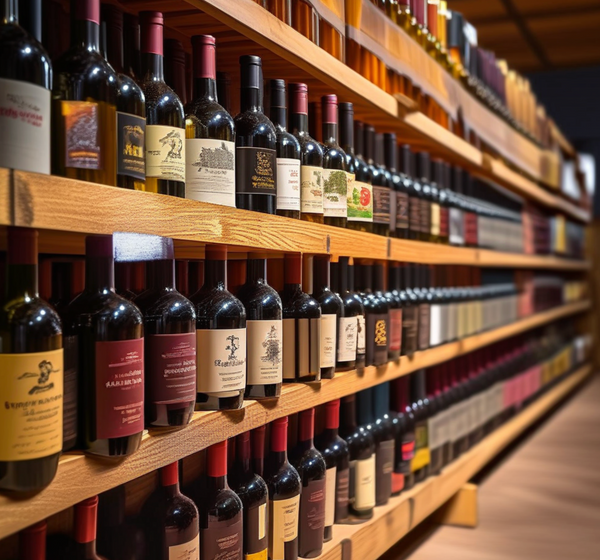How to Properly Store Red and White Wine: Tips for Hong Kong Wine Lovers
Aug 09, 2024
Temperature, Humidity, Darkness Control for Wine
Proper wine storage is crucial for preserving the quality and flavour of your favorite reds and whites. Whether you’re a seasoned collector or a casual enthusiast, understanding the right techniques can make all the difference. In this guide, we will discuss the best ways to store wine, specifically considering the conditions in Hong Kong's climate.
People know Hong Kong for its humid subtropical climate, which features hot, humid summers and mild, relatively dry winters. These conditions can pose unique challenges for storing wine. Learn the best ways to store your wine to keep it safe and ready to drink.
1. Ideal Temperature
The temperature at which you store your wine is arguably the most critical factor in preserving its quality. Both red and white wines have specific temperature ranges that help maintain their flavours and aromas.
- Red wines: 54-65°F (12-18°C) – Red wines should be stored at a slightly warmer temperature than white wines. This range helps preserve the complex flavors and aromas that are characteristic of reds. When red wine is stored too warm, it can age prematurely, losing its balance and becoming overly tannic. Conversely, if stored too cold, the flavours may become muted, and the wine can develop off-flavours.
- White wines: 45-54°F (7-12°C) – White wines are more delicate than reds and should be stored at a cooler temperature. This range helps to maintain the crispness and acidity that is typical of white wines. Storing white wine too warm can cause it to age too quickly, resulting in a loss of freshness. If stored too cold, it can lose its vibrant flavors and aromas.
- Sparkling wines: While not the main focus of this article, it's worth noting that sparkling wines should be stored even cooler, ideally at 40-45°F (4-7°C). This helps to maintain the bubbles and ensures a lively, refreshing experience when opened.
One of the most important things to remember is to avoid temperature fluctuations. Wine should be stored at a constant temperature within the recommended range. Rapid changes in temperature can cause the wine to expand and contract, which can lead to leakage or oxidation, both of which can ruin the wine.
2. Humidity Control
Humidity is another important factor in wine storage. The ideal humidity level for storing your wines is between 50-70%. Humidity control is essential because it helps keep the corks from drying out. If the cork dries out, it can shrink, allowing air to enter the bottle and oxidize the wine.
In Hong Kong, where humidity levels can be exceptionally high, this can be a challenge. High humidity can cause labels to peel and even lead to mould growth on the corks. To combat this, consider investing in a wine fridge or wine cellar that has humidity control features.
- Wine Fridge: A wine fridge is an excellent option for those who have a small to medium-sized collection. These fridges keep your wines in the best conditions by keeping a steady temperature and humidity level. Wine fridges often have separate zones for red, white, and sparkling wines, so you can store them at their best temperatures.
- Wine Cellar: For those with a larger collection or who want to store their wines long-term, a dedicated wine cellar is the best option. A good wine cellar keeps wine at the right temperature and humidity for aging. In Hong Kong, where space can be limited, consider converting a small room or part of a basement into a wine cellar.
3. Darkness is Key
Light, particularly UV light, can be highly damaging to wine. Exposure to light can cause chemical reactions in the wine, leading to a condition known as "light strike," which can give the wine an unpleasant smell and taste. This is why most wine bottles are made from colored glass, which helps to filter out some of the UV light.
However, even coloured bottles are not entirely immune to light damage. Therefore, it's essential to store wines in a dark environment. If you don’t have a dedicated wine cellar, find a dark spot in your home, such as a closet or a corner of a room that is away from direct sunlight. Avoid storing wine near windows or in brightly lit areas.
4. Place Wine Bottles Horizontally
The way you position your wine bottles during storage is also crucial. Wine bottles should be stored horizontally, especially if they have corks. Storing wine bottles horizontally ensures that the cork remains in contact with the wine, keeping it moist. A dry cork can shrink, allowing air to seep into the bottle, which can lead to oxidation and spoilage.
If you have a wine fridge or wine racks in a cellar, make sure they are designed to hold the bottles horizontally. This is particularly important for long-term storage, as keeping the corks moist is vital for preserving the wine over extended periods.
5. Minimize Vibration
Vibration is an often-overlooked factor in wine storage. Constant or frequent vibrations can disturb the sediment that forms in wine, especially in older red wines. This sediment is natural and should remain undisturbed to keep the wine clear and the flavours intact. If the sediment is shaken up, it can mix with the wine, leading to a gritty texture and altered flavor.
To minimize vibration, ensure that your wine fridge or wine cellar operates quietly. Avoid storing wine near appliances that generate vibrations, such as refrigerators, washing machines, or dryers. If possible, place your wine storage away from high-traffic areas where footfalls or other movements might cause vibrations.
6. Consider Storage Services
In Hong Kong, where space is often at a premium, many wine lovers turn to professional wine storage services. These services offer dedicated wine storage facilities that are specifically designed to provide the ideal conditions for storing your wines.
- Temperature and Humidity Control: Professional wine storage services maintain constant temperatures and humidity levels, ensuring that your wines are stored in optimal conditions. This is particularly beneficial for those who have valuable collections or who are looking to age their wines over many years.
- Security: In addition to providing the right environmental conditions, professional storage services often offer enhanced security features, such as 24/7 monitoring and climate control, giving you peace of mind that your investment is protected.
- Convenience: Many wine storage services also offer additional benefits, such as online inventory management, which allows you to keep track of your collection from anywhere. Some even offer delivery services, so you can have a bottle delivered to your home when you’re ready to enjoy it.
If you lack space at home or want to ensure that your collection is kept in the best possible condition, professional wine storage might be the perfect solution.
7. Monitor Your Wine Collection
Regularly checking the condition of your wine collection is essential, especially if you have bottles that have been stored for an extended period. Inspect the bottles for any signs of leakage, damage, or mold. Pay particular attention to the corks, as any signs of shrinkage or mould could indicate that the wine has been compromised.
When you open a bottle, it's best to consume it within a few days. Once exposed to air, the wine begins to oxidize, which can change its taste and aroma. To keep an opened bottle of wine fresh longer, use a wine preservation system to remove air and seal the bottle tightly.
Conclusion
By following these tips, you can ensure that your red and white wines remain fresh and flavourful. Whether you're storing a single bottle or a vast collection, maintaining optimal conditions will enhance your wine-drinking experience. In Hong Kong, where the weather can make it hard to store wine, following these tips will be worth it in the end. Cheers to enjoying your favorite wines at their best!


